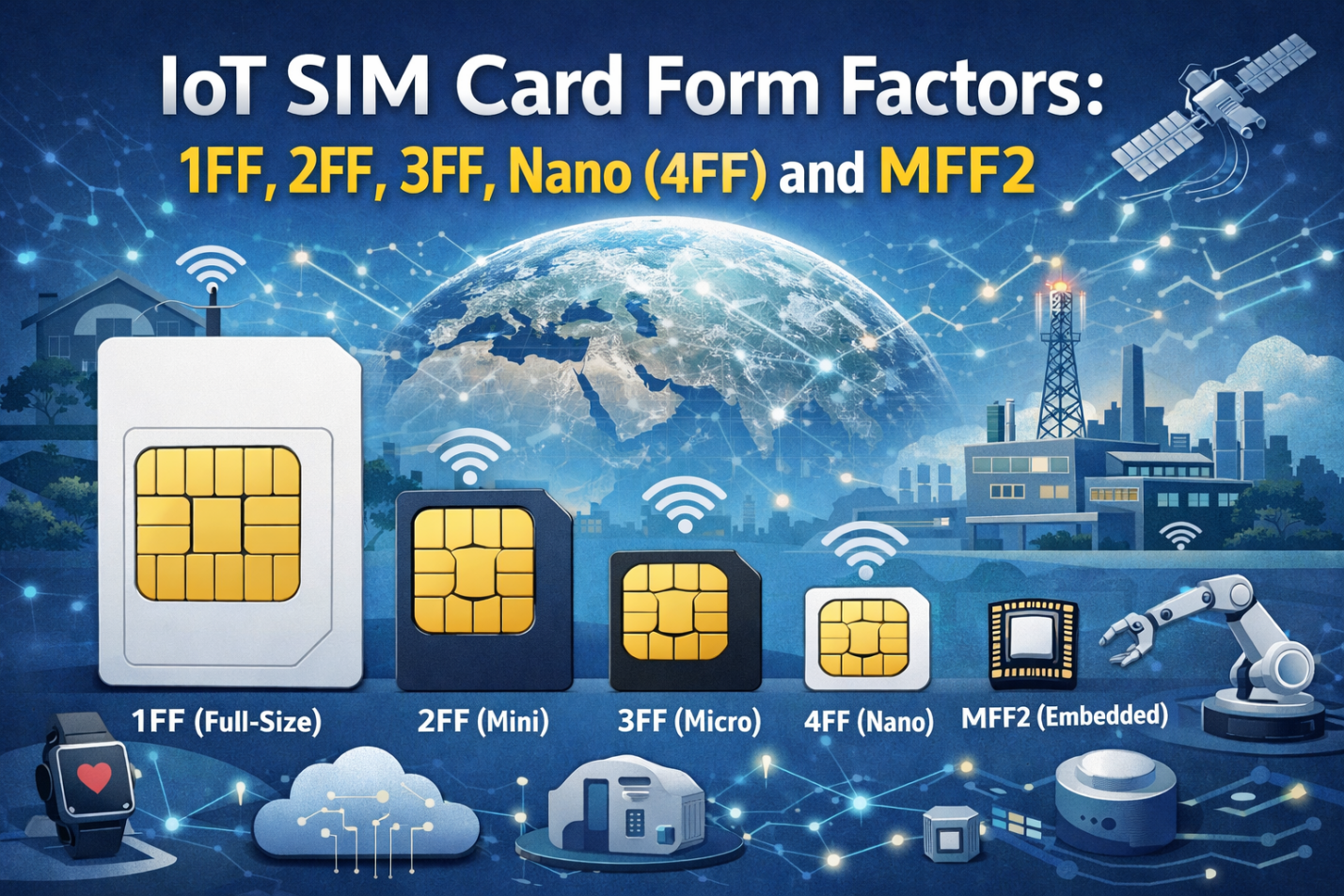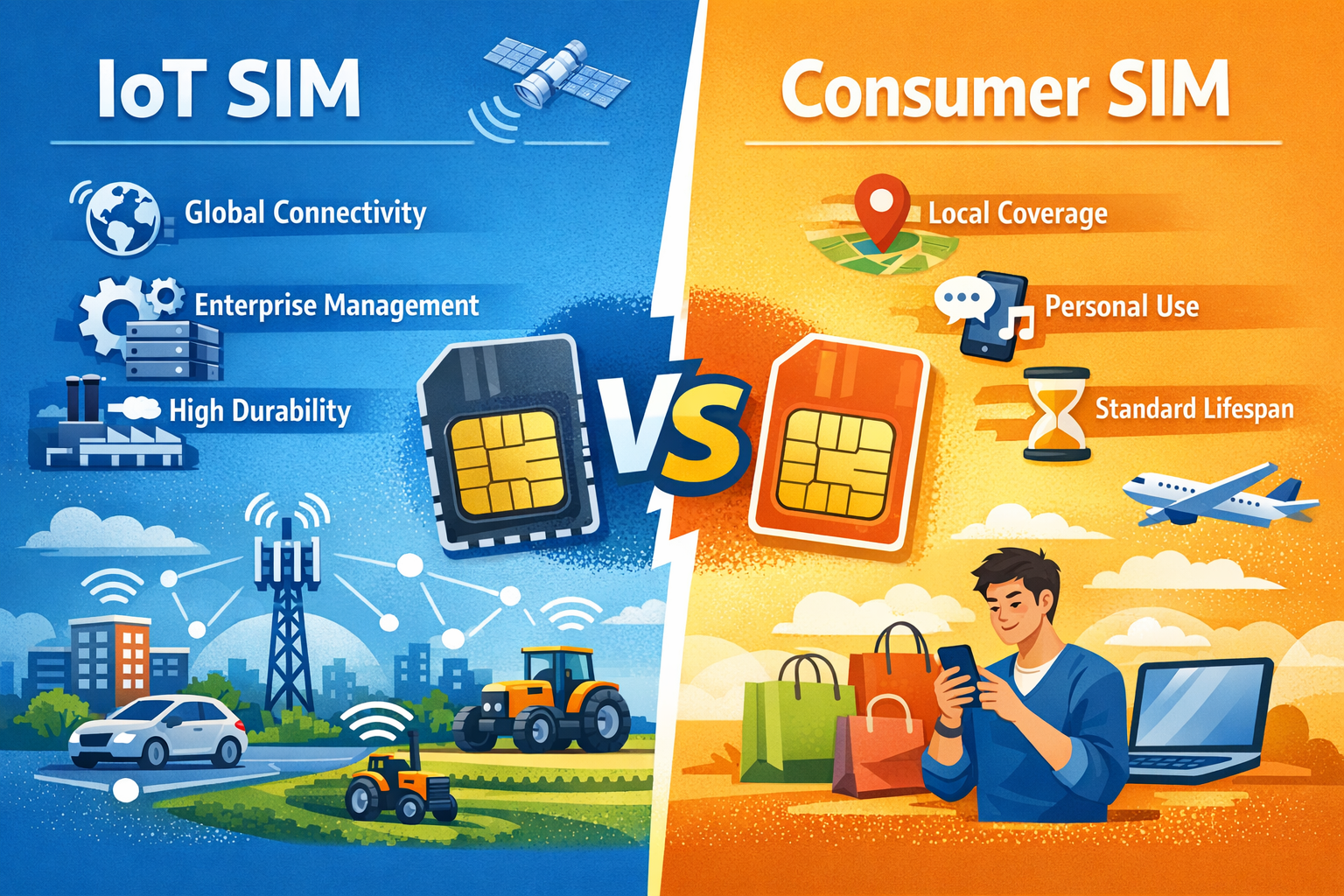Introduction
The Internet of Things (IoT) is no longer a futuristic concept—it’s a reality transforming industries worldwide. From smart cities to industrial automation, connected vehicles, and healthcare monitoring, IoT devices are becoming an integral part of modern life. However, for these devices to operate effectively, they need a reliable method to connect to the internet, exchange data, and communicate with other devices and servers. This is where IoT SIM cards come into play.
At Zhongyi IoT, we specialize in providing high-quality IoT SIM cards designed for seamless connectivity, enhanced security, and global coverage. This article explores why IoT devices require SIM cards, the types of IoT SIM cards available, their benefits, and how businesses can leverage them to optimize their IoT deployments.
1. What is an IoT SIM Card?
An IoT SIM card is a specialized SIM card designed specifically for Internet of Things devices. Unlike traditional SIM cards used in smartphones, IoT SIM cards are optimized for:
- Long-term deployments: IoT devices may operate for years without human intervention.
- Low-power consumption: Essential for battery-powered sensors and devices.
- Wide-area connectivity: Capable of connecting across multiple networks and countries.
IoT SIM cards act as the bridge between your devices and the network, enabling data transfer, remote management, and reliable communication.
2. Why IoT Devices Require SIM Cards
IoT devices are designed to collect, transmit, and process data. Without a reliable communication method, these devices cannot function as intended. Here are the main reasons why IoT devices need SIM cards:
2.1 Reliable Connectivity
IoT SIM cards provide a dedicated communication channel for devices. Unlike Wi-Fi or short-range connectivity, cellular IoT ensures that devices remain connected in remote areas, industrial facilities, vehicles in motion, or distributed sensor networks.
2.2 Global Reach
Many IoT deployments are international. IoT SIM cards, especially those provided by global operators like Zhongyi IoT, allow devices to connect seamlessly across countries and networks, enabling global operations without the need to physically swap SIM cards.
2.3 Security
Security is critical in IoT applications, especially for industrial or healthcare devices. IoT SIM cards support encrypted data transmission, authentication, and secure network access, protecting sensitive information from potential cyber threats.
2.4 Remote Management
IoT devices often operate in inaccessible locations. IoT SIM cards can be remotely managed through a platform that allows operators to activate, suspend, or monitor devices in real-time, simplifying device management at scale.
2.5 Scalability
IoT SIM cards enable businesses to scale their IoT deployments efficiently. Whether you need 100 or 10,000 devices online, IoT SIM cards allow mass provisioning and remote configuration, making large-scale deployments feasible.
3. Types of IoT SIM Cards
IoT SIM cards come in several types, each optimized for specific use cases and network conditions:
3.1 Standard IoT SIM
- Functions like a traditional SIM but optimized for IoT devices.
- Ideal for applications requiring cellular connectivity but low data consumption.
3.2 M2M SIM
- Stands for Machine-to-Machine SIM.
- Supports industrial devices, sensors, and automated systems.
- Often provides higher durability, temperature resistance, and longer lifespan.
3.3 eSIM for IoT
- Embedded SIM cards that can be programmatically configured without physical swapping.
- Suitable for devices deployed in hard-to-reach locations.
- Supports multiple network profiles, providing network flexibility and redundancy.
3.4 NB-IoT and LTE-M SIM
- Designed for narrowband IoT (NB-IoT) and LTE-M networks.
- Low power consumption, long battery life.
- Best for smart meters, environmental sensors, and remote monitoring devices.
4. Benefits of Using IoT SIM Cards
Investing in IoT SIM cards for your devices provides several tangible benefits:
4.1 Reliable Device Communication
IoT SIM cards ensure devices maintain a continuous connection, even in areas with weak network signals. This is crucial for applications like vehicle tracking, industrial monitoring, and emergency response systems.
4.2 Cost Efficiency
- By choosing data-efficient SIM plans, companies can significantly reduce operational costs.
- IoT SIM cards often support bulk data packages and long-term subscriptions, making them more cost-effective than regular mobile plans.
4.3 Enhanced Security
IoT SIM cards include network-level security features, such as encrypted channels and SIM-based authentication, which are essential for protecting sensitive industrial or healthcare data.
4.4 Remote Configuration and Management
Operators can update SIM profiles, monitor usage, and troubleshoot issues remotely, eliminating the need for manual intervention, saving time and resources.
4.5 Global Deployment
- IoT SIM cards allow international operations without changing physical SIM cards.
- Ideal for logistics, fleet management, and multinational IoT projects.
5. Common IoT Applications Using SIM Cards
IoT SIM cards are deployed across a wide range of industries:
5.1 Smart Cities
- Connected streetlights, traffic sensors, parking meters, and surveillance cameras.
- IoT SIM cards provide reliable connectivity for real-time data transmission and analytics.
5.2 Industrial Automation
- Factories, refineries, and energy plants rely on IoT SIM cards to monitor machinery, track production metrics, and prevent downtime.
5.3 Connected Vehicles and Logistics
- Vehicle tracking, fleet management, and cold chain monitoring.
- IoT SIM cards enable constant communication, ensuring route optimization and safety compliance.
5.4 Healthcare and Remote Monitoring
- Patient monitoring devices, wearable health trackers, and medical equipment.
- IoT SIM cards ensure real-time data transmission for timely medical decisions.
5.5 Agriculture and Environmental Monitoring
- Soil sensors, irrigation systems, and weather monitoring devices.
- IoT SIM cards enable data-driven farming for higher yields and resource efficiency.
6. How to Choose the Right IoT SIM Provider
Selecting the right provider is crucial for IoT deployment success. Here are key factors:
6.1 Network Coverage
- Ensure the provider has extensive local and international network coverage.
- Zhongyi IoT offers multi-network connectivity to guarantee uptime and reliability.
6.2 Data Plans and Flexibility
- Choose a provider offering customizable plans based on device usage and data needs.
6.3 Security and Compliance
- The provider should offer end-to-end encryption, authentication, and comply with global data security standards.
6.4 Management Platform
- Look for a provider that offers a user-friendly IoT SIM management platform for monitoring, activating, and troubleshooting devices.
6.5 Customer Support
- 24/7 technical support is essential for maintaining large-scale IoT deployments.
7. Why Zhongyi IoT Stands Out
At Zhongyi IoT, we provide a comprehensive suite of IoT SIM solutions:
- Global Coverage: Operate your IoT devices anywhere in the world.
- Multiple SIM Options: MFF2, CAT M1, NB-IoT, and eSIM.
- Flexible Plans: Unlimited data or tailored plans to match your business needs.
- Advanced Management Platform: Monitor usage, activate or suspend devices remotely.
- Secure and Reliable: End-to-end encryption and network redundancy ensure uptime.
Our IoT SIM cards empower businesses to scale operations, reduce costs, and maintain uninterrupted device connectivity across industries.
8. Future Trends in IoT Connectivity
The IoT landscape is evolving rapidly, and SIM cards are at the heart of this transformation:
- 5G IoT SIM Cards: Ultra-low latency and high-speed connectivity for autonomous vehicles, smart cities, and AR/VR devices.
- Global eSIM Adoption: Simplified device provisioning and multi-network support for international deployments.
- Data Analytics Integration: SIM management platforms are increasingly integrating AI-based analytics to optimize connectivity and usage.
- Sustainable IoT: Energy-efficient SIM cards for low-power devices contribute to greener operations.
9. Conclusion
IoT devices are revolutionizing industries worldwide, but without reliable connectivity, their potential cannot be fully realized. IoT SIM cards are the backbone of this connectivity, enabling secure, scalable, and global operations.
By partnering with Zhongyi IoT, businesses can access high-quality IoT SIM cards that support NB-IoT, CAT M1, eSIM, and global connectivity, ensuring devices remain online, data is secure, and operations are efficient.
Whether it’s smart cities, industrial automation, healthcare, logistics, or agriculture, IoT SIM cards are essential for achieving reliable and cost-effective IoT deployments.
Connect your devices. Secure your data. Scale your operations. Choose Zhongyi IoT for your IoT SIM solutions.



